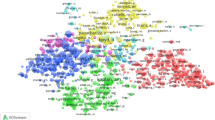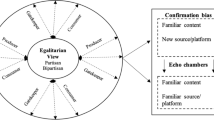Abstract
As the political and media landscape becomes more complex, political parties and candidates worldwide are continually exploring new ways and ideas to effectively communicate their messages to their target audience. Throughout the political history of Ghana, the mass media has played an integral role in political marketing successes. However, with the advent of the digital economy, social media platforms have unfolded new possibilities for politicians to engage with citizens. The study examined the extent to which political message dissemination on social media by politicians in Ghana influence young voters’ political knowledge, efficacy, and participation. A quantitative approach was adopted and data were analysed using structural equation modelling. Findings revealed positive and significant relationships between political message dissemination on social media and political participation, political knowledge, and political efficacy of young voters. Overall, the findings revealed that political participation, especially amongst young voters, could be enhanced through the use of social media.

Similar content being viewed by others
Data availability
The datasets generated and/or analyzed during the current study are available from the corresponding author on reasonable request.
References
Bagozzi RP, Yi Y (2012) Specification, evaluation, and interpretation of structural equation models. J Acad Mark Sci 40(1):8–34
Bimber B, Davis R (2003) Campaigning online: the Internet in US elections. Oxford University Press, New York
Boczkowski PJ, Mitchelstein E, Matassi M (2018) “News comes across when I’m in a moment of leisure”: Understanding the practices of incidental news consumption on social media. New Media Soc 20(10):3523–3539. https://doi.org/10.1177/1461444817750396
Bode L (2016) Political news in the news feed: learning politics from social media. Mass Commun Soc 19(1):24–48
Burns AC, Bush RF (2013) Marketing research, 7th edn. Pearson Higher Education, Upper Saddle River
Butler P, Collins N (1994) Political marketing: structure and process. Eur J Mark 28(1):19–34
Byrne BM (2016) Structural equation modeling with Amos: basic concepts, applications, and programming. Routledge
Cacciatore MA, Yeo SK, Scheufele DA, Xenos MA, Brossard D, Corley EA (2018) Is Facebook making us dumber? Exploring social media use as a predictor of political knowledge. Journal Mass Commun Q 95(2):404–424
Chaffee SH, Zhao X, Leshner G (1994) Political knowledge and the campaign media of 1992. Commun Res 21(3):305–324
Chaffee S, Frank S (1996) How Americans get political information: print versus broadcast news. Ann Am Acad Polit Soc Sci Commun 55(1):71–84
Deepak BJ, Rodrigues UM, Rani P (2020) Mediamorphosis of regional newspapers: utilization of the Internet’s potential by Kannada media. Asia–Pac Media Educ 30(1):59–76
Delli Carpini MX (2000) Gen.com: youth, civic engagement, and the new information environment. Polit Commun 17(4):341–349
Delli Carpini MX (2005) An overview of the state of citizens' knowledge about politics. Departmental Papers (ASC), 53
Dimitrova DV, Shehata A, Strömbäck J, Nord LW (2011) The effects of digital media on political knowledge and participation in election campaigns: evidence from panel data. Commun Res 41(1):95–118
Drew D, Weaver D (1998) Voter learning in the 1996 presidential election: did the media matter? Journal Mass Commun Q 75(2):292–301
Edgerly S, Thorson K, Wells C (2018) Young citizens, social media, and the dynamics of political learning in the US presidential primary election. Am Behav Sci 62(8):1042–1060
Essoungou AM (2010) A social media boom begins in Africa: using mobile phones, Africans join the global conversation. Africa Renewal Online. Expert opinions of recent political elections in Ghana. J Afr Bus 11(2):201–218
Fidler R (1997) Mediamorphosis: understanding new media. Pine Forge Press. Final Thesis for Master of Business Administration in Marketing Management. Department of Business Administration, University of Gävle
Foot K, Schneider SM (2006) Web campaigning (acting with technology). The MIT, Cambridge
Fornell C, Larcker DF (1981) Evaluating structural equation models with unobservable variables and measurement error. J Mark Res 18(1):39–50
Gerbing DW, Anderson JC (1988) An updated paradigm for scale development incorporating unidimensionality and its assessment. J Mark Res 25(2):186–192
Gil de Zúñiga H, Diehl T, Ardévol-Abreu A (2017) Internal, external, and government political efficacy: effects on news use, discussion, and political participation. J Broadcast Electron Media 61(3):574–596
Gogoi N (2020) Social media and political campaign: an analysis. J Nat Remedies 21(8):193–195
Gyampo REV (2017) Social media, traditional media and party politics in Ghana. Afr Rev 9(2):125–139
Hinson R, Tweneboah-Koduah EY (2010) Political marketing strategies in Africa: expert opinions of recent political elections in Ghana. J Afr Bus 11(2):201–218
Jones S (2002) The Internet goes to college. Pew Internet and American life. USDLA J 16(10):n10
Jung N, Kim Y, De Zúniga HG (2011) The Mediating Role of Knowledge and Efficacy in the Effects of Communication on Political Participation. Mass Commun Soc 14(4):407–430. https://doi.org/10.1080/15205436.2010.496135
Kaid LL, Holtz-Bacha C (eds) (2007) Encyclopedia of political communication. SAGE, Thousand Oaks
Kaid LL, McKinney MS, Tedesco JC (2007) Introduction: political information efficacy and young voters. Am. Behav Sci 50(9):1093–1111. https://doi.org/10.1177/0002764207300040
Kenski K, Stroud NJ (2006) Connections between Internet use and political efficacy, knowledge, and participation. J Broadcast Electron Media 50(2):173
Kim YM, Geidner NW (2008) Politics as friendship: the impact of online social networks on young voters' political behaviour. In: 58th International Communication Association conference, Montreal, vol 22
Klinger U, Russmann U (2017) “Beer is more efficient than social media”—political parties and strategic communication in Austrian and Swiss national elections. J Inf Technol Polit 14(4):299–313
Kotler P, Kotler N (1981) Business marketing for political candidates. Campaigns Elect 2(2):24–33
Kushin MJ, Yamamoto M (2010) Did social media matter? College students use online media and political decision making in the 2008 election. Mass Commun Soc 13(5):608–630
Lee S, Xenos M (2019) Social distraction? Social media use and political knowledge in two US Presidential elections. Comput Hum Behav 90:18–25
Lees-Marshment J (2019) Marketing scholars and political marketing: the pragmatic and principled reasons for why marketing academics should research the use of marketing in the political Arena. Custom Needs Solut 6(3):41–48
Lilleker DG, Koc-Michalska K (2017) What drives political participation? Motivations and mobilization in a digital age. Polit Commun 34(1):21–43
Macedo IM (2017) Predicting the acceptance and use of information and communication technology by older adults: an empirical examination of the revised UTAUT2. Comput Hum Behav 75:935–948
Malhotra NK, Birks DF (2007) Marketing research: an applied approach. Pearson, Harlow
Mensah K (2016) Political brand architecture: towards a new conceptualisation of political branding in an emerging democracy. Afr Journal Stud 37(3):61–84
Mensah K (2017) Political marketing and management: a new architecture. In: Political marketing and management in Ghana. Palgrave Macmillan, Cham, pp 1–16
Mishra P, Pandey CM, Singh U, Gupta A, Sahu C, Keshri A (2019) Descriptive statistics and normality tests for statistical data. Ann Card Anaesth 22(1):67
Ndavula JO, Mueni J (2014) New media and political marketing in Kenya: the case of 2013 general elections. Int J Arts Commerce 3(6):69–84
Newman BI, Sheth JN (1985) Political marketing: readings and annotated bibliography. American Marketing Association
Nunnally JC, Bernstein IH (1994) The Assessment of Reliability. Psychom Theory 3(1):248–292
O’Cass A (1996) Political marketing and the marketing concept. Eur J Mark 30(10/11):37–53
O’cass A (2002) Political advertising believability and information source value during elections. J Advert 31(1):63–74
Olusola A, Ibrahim S, Priscilla G (2017) An Era of Journalism Transition in South Africa: Traditional Media versus Online Media. J Soc Sci 51(1–3):1–5. https://doi.org/10.1080/09718923.2017.1305580
Pallant J (2013) SPSS survival manual. McGraw-Hill Education, London
Pennington N, Winfrey KL, Warner BR, Kearney MW (2015) Liking Obama and Romney (on Facebook): an experimental evaluation of political engagement and efficacy during the 2012 general election. Comput Hum Behav 44:279–283
Reichert F (2016) How internal political efficacy translates political knowledge into political participation: evidence from Germany. Eur J Psychol 12(2):221
Shama A (1975) An analysis of political marketing. In: SV-broadening the concept of consumer behaviour. Association for Consumer Research, pp 106–116
Sinha M, Sheth J (2018) Growing the pie in emerging markets: marketing strategies for increasing the ratio of non-users to users. J Bus Res 86:217–224
Soman D, Cowen D, Kannan N, Feng B (2019) Seeing sludge: towards a dashboard to help organizations recognize impedance to end-user decisions and action
Strandberg K (2013) A social media revolution or just a case of history repeating itself? The use of social media in the 2011 Finnish parliamentary elections. N Media Soc. https://doi.org/10.1177/1461444812470612
Talaue GM, AlSaad A, AlRushaidan N, AlHugail A, AlFahhad S (2018) The impact of social media on academic performance of selected college students. Int J Adv Inf Technol 8(4/5):27–35
Vitak J, Zube P, Smock A, Carr CT, Ellison N, Lampe C (2011) It’s complicated: Facebook users’ political participation in the 2008 election. Cyberpsychol Behav Soc Netw 14(3):107–114
Wei R, Lo VH (2008) News media use and knowledge about the 2006 US midterm elections: Why exposure matters in voter learning. Int J Public Opin Res 20(3):347–362
Wells SD, Dudash EA (2007) Wha’d’ya know? Examining young voters’ political information and efficacy in the 2004 election. Am Behav Sci 50(9):1280–1289
Williams CB (2017) Introduction: Social media, political marketing and the 2016 US election. J Polit Mark 16(3–4):207–211
Wolak J (2018) Feelings of political efficacy in the fifty states. Polit Behav 40(3):763–784
Wring D (1999) The marketing colonisation of political campaigning. In: Newman B (ed) A handbook of political marketing. Sage, London
Yamamoto M, Nah S, Bae SY (2020) Social media prosumption and online political participation: an examination of online communication processes. N Media Soc 22(10):1885–1902
Zaheer L (2016) Use of social media and political participation among university students. Pak Vis 17(1):278–299
Acknowledgements
The authors would like to thank Dr Adelaide Kastner formerly at University of Ghana Business School for her insightful comments and suggestions.
Funding
No external funding was received by the authors for this study.
Author information
Authors and Affiliations
Corresponding author
Ethics declarations
Conflict of interest
The authors of this article did not receive any funding or what so ever from any entity, and therefore declare that we (severally or jointly) have no conflict of interest.
Supplementary Information
Below is the link to the electronic supplementary material.
Rights and permissions
About this article
Cite this article
Dankwah, J.B., Mensah, K. Political marketing and social media influence on young voters in Ghana. SN Soc Sci 1, 152 (2021). https://doi.org/10.1007/s43545-021-00151-4
Received:
Accepted:
Published:
DOI: https://doi.org/10.1007/s43545-021-00151-4




